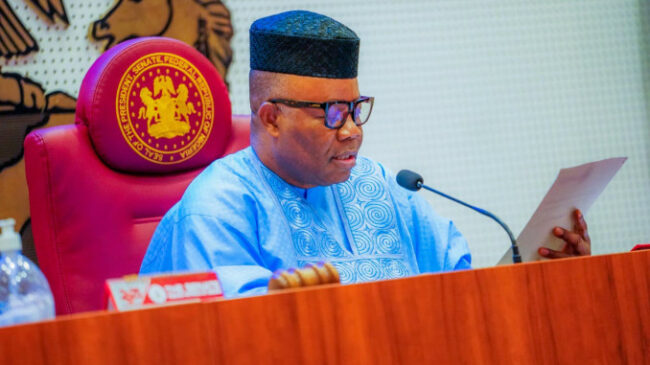The Senate, at its plenary on Thursday, passed through second reading a bill seeking to conduct general elections for the offices of the President, State Governors, National Assembly members, State Houses of Assembly members, and Local Government Area Councillors simultaneously on the same date.
Titled A Bill for an Act to Amend the Electoral Act (Amendment) Bill, 2025 (SB. 701), it was sponsored by the Senator representing Kwara Central, Saliu Mustapha.
Presenting his lead debate, the Kwara lawmaker said that apart from the simultaneous conduct of elections, the bill also seeks to address “the exclusion of elected office holders, which includes the President, Vice President, Members of the National Assembly, Governors and their Deputies, Members of the State Houses of Assembly, Chairmen of Local Government Councils, Councillors, Members of the National Working Committee of Political Parties, amongst others, from participating in the convention, congress or meeting of the political party they belong to.”
He maintained that the exclusion of such statutory delegates was a major flaw in the extant Electoral Act 2022.
Senator Mustapha, who expressed concern over the enormous cost associated with staggered elections, further noted that conducting elections on the same day would reduce expenses related to general elections.
He said: “Mr. President, Distinguished colleagues, the proposed bill, when passed into law, aims to reduce the cost of elections in Nigeria, which has been on a steady rise since 1999. The cost of the general election increased from N1.5 billion in 1999 to N350 billion in 2023. This exponential increase is unsustainable and undermines the democratic process.
“The bill proposes holding elections on the same day and date to enable the government to minimise the costs associated with prolonged campaign periods and staggered elections. Same-day elections will also increase voter turnout and promote greater citizen engagement in the electoral process. It will reduce the cost of elections and promote a more efficient electoral process, which will strengthen our democratic institutions and foster an inclusive and participatory democracy that will reduce logistical challenges.
“The bill further proposes to reduce the campaign period. This approach is expected to lessen the financial burden on political parties, candidates, and the government and minimise the impact of campaign activities on governance. By adopting this strategy, Nigeria can align itself with global best practices and promote a more efficient and cost-effective electoral process.
ALSO READ: Seat reservation bill will empower women to take rightful place in corridors of power – Kalu
“The ultimate aim is to address the inefficiencies of staggered elections, which are not only costly but also ineffective.”
Contributing to the debate, the Senator representing Edo North, Adams Oshiomhole, urged the Senate to exercise caution, submitting that the Independent National Electoral Commission (INEC) was already overwhelmed even with staggered elections.
He said: “While the bill has good intentions, we must ensure that INEC is adequately prepared for the enormous task of conducting elections for all levels of government in one day.”
He also raised concerns over the challenge of distributing multiple ballot papers to an illiterate electorate, potentially creating confusion.
ALSO READ TOP STORIES FROM NIGERIAN TRIBUNE
